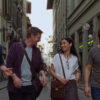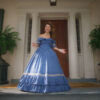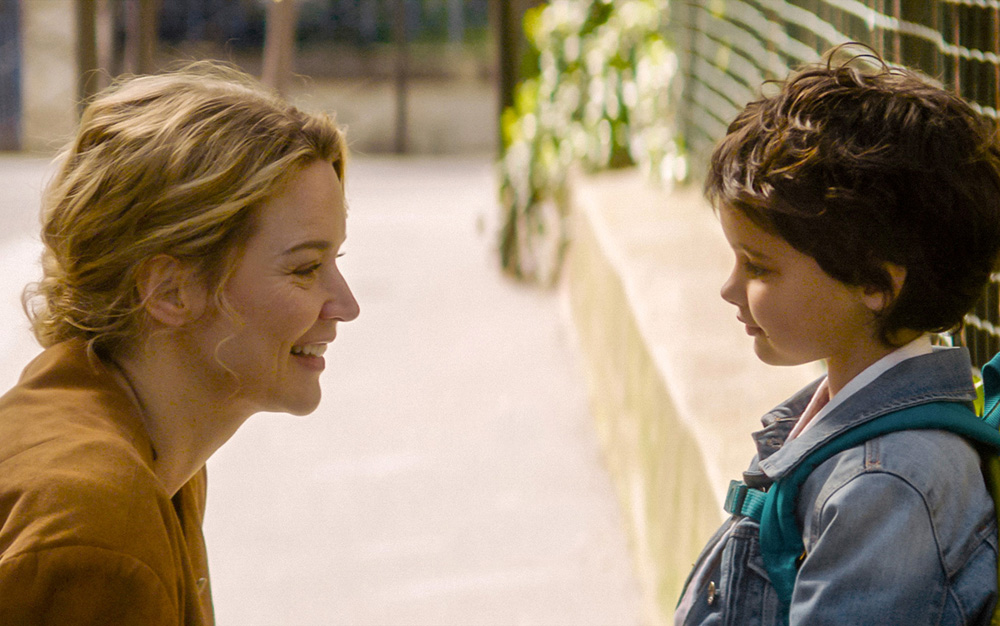Virginie Efira couldn’t contain her excitement when she saw Rebecca Zlotowski’s directorial debut “Belle Épine (Dear Prudence)” for the first time.
“When I saw this movie, I cried after because [Rebecca] is so good at filming what cannot be said,” Efira recalls, once saying that she bought DVDs for her entire family to watch at a point in her own career when she was she just starting to think of the possibilities after first achieving fame as a TV presenter and began thinking seriously about acting. “After that, I was shy and I never [said], ‘Oh please, can we work together?’ But now, of course we must do something together, and [like another film I made] ‘Victoria’ with Justine Triet, this kind of movie [where] you are so close to the director, I think it creates something and the movie shows it.”
The two would finally join forces just over a decade later on “Other People’s Children,” a luminous romantic comedy in which Efira plays a surrogate of sorts for her director as Rachel, attending Rosh Hashanah services with Zlotowski’s real-life father (Michel Zlotowski) and buzzing about Paris with an extra bit of energy as a woman in love, having fallen head over heels for Ali (Roschdy Zem), who she meets taking guitar lessons and has similar zest for life. The couple may not be able to tear away from one another in the early days of their relationship, but Rachel finds herself dealing with another type of entanglement when pursuing a life with Ali means stepping into the role of a stepmother to his four-year-old daughter Leïla (Callie Ferreira-Goncalves) and adjusting her life to handle the complications of his as a parent who splits custody with his ex (Chiara Mastroianni), a situation Zlotowski went through herself personally.
If Efira bided her time to work with the best filmmakers in her adopted home of France – born in Belgium, her French citizenship coincided with roles in Paul Verhoeven’s “Elle” and Justine Triet’s “Victoria” that set her up to take the country by storm with subsequent collaborations – it was worth the wait for those who have collaborated with her as she’s grown into one of the most captivating screen presences in the world, both ferociously poised yet enormously sensitive as she lets audiences into how the world leaves its mark on the characters she plays, equally adept and drama and comedy and making no situation seem as if’s entirely out of her control. It’s no wonder then why Zlotowski could entrust Efira with a character so close to her heart in “Other People’s Children,” able to find both the absurdity and potential heartbreak in being abruptly cast in a new family, nor that Alice Winocour recently wanted the actress to star in “Revoir Paris,” based in part on her brother’s experiences processing the trauma in the aftermath of the mass shooting at the Bataclan during an Eagles of Death Metal concert that he attended in 2015, and Efira would eventually win her first Cesar Award for.
Efira’s extraordinary range enabled Zlotowski and Winocour to make two of their most magnificent films to date, both carrying an unexpected amount of weight when entering them with thoughts of how heavy or light they’ll be, and after making waves on the fall festival circuit and crossing the Atlantic, “Other People’s Children” and “Revoir Paris” are bound to make a splash in America, with the latter arriving in June and the former in theaters this week and when Efira was recently in New York for the Rendezvous with French Cinema festival at Lincoln Center, she graciously took the time to talk about this most exciting pair of films, the advantages to coming to acting later in life and working with directors so closely connected with the stories they’re putting on screen.
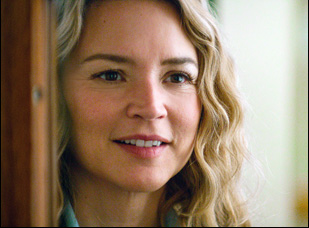
What I look for is to work with filmmakers that I feel I can share something with and whose world vision I share. Obviously to be in a situation where you have to reproduce the same thing all the time, it [becomes] a bit boring, so I find that it’s the filmmaker’s gaze that makes the difference. That’s what allows me to go into a different world. In Alice [Winocour]’s movie, “Revoir Paris.” It’s like the character is not really alive after the terrible tragedy. She’s like a zombie. She can feel the life and feel the city, and the difference is huge [when compared to] Rebecca’s character [in “Other People’s Children”], where [she’s] sunny and full [of life] She want to give [all of herself to everyone], but who wants to receive.
Knowing that there was an autobiographical element in these stories for both these filmmakers, did that change the relationship you had to the material?
Yes, I work a lot with female directors in France and all the time it was something very near to their own story. For me, that’s a gift because you can be really near yet like a fusion. Sometimes I speak like Rebecca in Rebecca’s movie, and in Alice’s, it’s more that you take something in her to understand what you do and sometimes you find something with your own life too — to not absolutely the same experience, but a little thing that can get bigger that’s in your own life.
Were there any details that could open these characters up for you?
The first thing is I always ask to the director to show me films that have a resonance with this one. For example [for “Other People’s Children”], Rebecca showed me Diane Keaton’s movies and the stories were not near the “Other People’s Children,” but when you saw Diane Keaton, she’s so mobile and always smiling, and maybe she’s sad [at times], she’s [always feeling], “Okay, life is great.” That’s a thing that I can take with me.
And Alice wanted me to look at two very good movies — [David] Cronenberg’s “The Dead Zone,” [where] Christopher Walken always has these big eyes because he’s [trying] to [see] inside your brain and see a ghost, it is real or no? And “Safe,” the great movie with Julianne Moore [where] everything is inside, and [there’s] a hundred of kilometers between you and the world, and you can feel this kind of impression. That’s a good way to go inside for me.
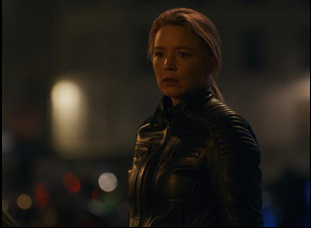
An actor alone is not a big thing — it’s a camera, and the way that Rebecca and Alice look at you. But in [“Other People’s Children”], I was absolutely free. Sometimes there is some improvisation and I could take my own experience [where I think] “Before I lived [through] some not-so-good things, but I can do something with that now during the shooting.” In Alice’s movie, it was different. Of course, I haven’t had that experience and to some extent, I will never fully understand it because I’ve not gone through it, but I fully trust her in terms of the kind of representation that she wanted and it was a lot more about technique. Like when someone speaks, you hear it, but not really — it comes very slowly at the brain. And for the preparation, I didn’t want to speak with victims because [I didn’t want it to feel like] tell me your experience and then after I can use it. But I did go to see some psychoanalysts or people who work with people [in this situation] to have some key [knowledge] about the dissociation and perception [in the wake of such a traumatic event].
You have some really interesting co-stars in “Other People’s Children,” in particular — Rebecca Zlotowski’s real-life father Michel and Frederick Wiseman. Was it interesting to play off of them?
Yes, it was so great. Of course, Rebecca’s father [made that relationship] seem so real and we had our own intimacy. We spoke before about the symbiosis between an actor and a filmmaker, and [with Rebecca] having made that choice, it made that even deeper. And then working with Frederick Wiseman, it was so incredible and to think that he was playing the role of my gynecologist, I remember that it was quite intimidating. He has that face that is such a face of an old, wise man and to see him do something so weird — to have a speculum so close to my body — it’s definitely a memory that will stay with me for my entire life. [laughs]
Speaking of intimidating scenes, there are a number of very big, communal public scenes in both of these. Are those moments daunting or exciting to be a part of?
I remember in Paul Verhoeven’s movie “Benedetta.” There were 300 or 400 people, and I said, “Oh, wow, it’s the first time for me for that.” So what helps is to go back and look at the director’s monitor on set because you realize that you are just one element. You’re part of something that’s much bigger than you, and it goes beyond the two or three actors, and whether it’s two or three or 300, it doesn’t really change much. You’re part of something broader and bigger, and it goes beyond you.
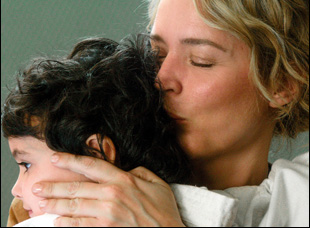
Yes, but I began very late too. I was past 30, so I never was a young girl in the movies and because in France, it’s not the same [way of thinking] in America, [it’s] more free about that. But I think in America too now, you have a lot of great character for women and there’s a lot to say about life after 40 and a lot of things to do because you have a life before, but you have a life after too that’s very interesting. When I began [my acting career], I was only 35, but I played something older in a movie, the name was “Un Amour de Fantome,” and I always play women [in their forties] — maybe when I was 55, I will play roles of 40. [laughs] But even when I was younger, I was always asked to play roles of women in their forties, so it’s as if there was something about me which leads me to explore that decade. And because you have a lot of female directors in France who want to speak about their own [experience], not their own life, but their own vision, their own sensibility, of course, they know that they want to film with women that are a little bit older.
“Other People’s Children” will be rolling out across the U.S. in the weeks to come, now open at the IFC Center and Film at Lincoln Center in New York and the Music Box Theatre in Chicago, and the Laemmle Royal in Los Angeles on April 28th, and “Revoir Paris” will open on June 23rd.

